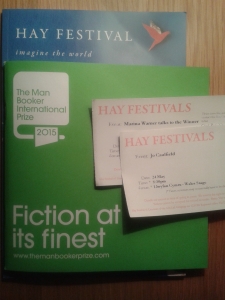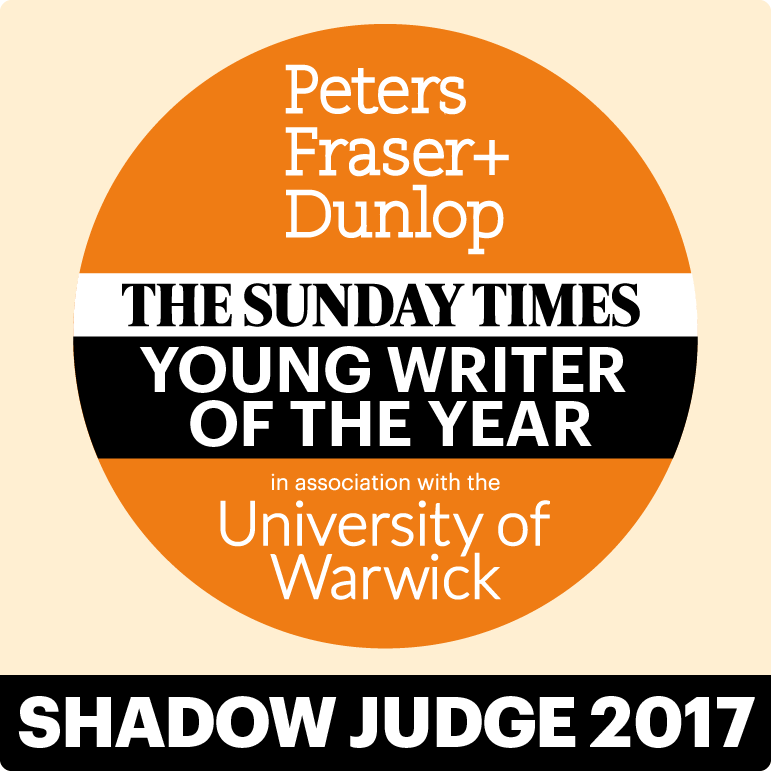This week, I am very excited to be at the Hay Festival in Wales attending various events, browsing lots of bookshops and maybe purchasing one or two books…

The first event I attended on Sunday evening was the Man Booker International Prize winner László Krasznahorkai in conversation with Dame Marina Warner, the Chair of the Prize’s panel, on the Oxfam Moot stage. Since its launch in 2005, the Man Booker International Prize has been awarded every two years to any living author writing fiction in English or whose work is widely translated into English. Unlike its sister prize the Man Booker Prize, it is awarded in recognition of the author’s whole body of work rather than a particular novel.
The previous three winners of the Man Booker International Prize were American or Canadian (Alice Munro in 2009, Philip Roth in 2011 and Lydia Davis in 2013). In 2013, it was announced that any author writing in the English language from anywhere in the world would be eligible for the Man Booker Prize which had previously only been open to authors from Commonwealth countries. Consequently, the most recent list of Man Booker International Prize finalists was noticeably more cosmopolitan compared to previous years. They are as follows:
- César Aira (Argentina)
- Hoda Barakat (Lebanon)
- Maryse Condé (Guadeloupe)
- Mia Couto (Mozambique)
- Amitav Ghosh (India)
- Fanny Howe (United States of America)
- Ibrahim al-Koni (Libya)
- László Krasznahorkai (Hungary)
- Alain Mabanckou (Republic of Congo)
- Marlene van Niekerk (South Africa)
László Krasznahorkai was announced as the winner on 19th May. His debut novel and best-known work ‘Sátántangó’ was first published in 1985 and the English translation by George Szirtes was longlisted for the Independent Foreign Fiction Prize and won the Best Translated Book Award in 2013. As Warner noted during her introduction, Krasznahorkai’s Man Booker International Prize win has been unanimously well-received and it is work like his which is helping to widen the appeal of translated fiction.
Much of the conversation revolved around the turning points in Krasznahorkai’s life and the impact these experiences have had on his work. Most notably, his discovery of the works of Franz Kafka from his brother at the age of twelve was a significant influence on his writing and fuelled his interest in exploring themes and situations from several different directions. The period after he left Hungary for the first time in the 1980s, spending several years living in various places including West Berlin, Mongolia, China and Japan has also been pivotal. Krasznahorkai says that when he starts to understand the place where he is, it is time to leave and move on.
At the end of the talk, Krasznahorkai gave two readings from his work – one in English followed by one in Hungarian. Interestingly, he sees the English translations of his work by George Szirtes and Ottilie Mulzet as entirely new creations. This is not to say that Krasznahorkai thinks the translations bear no resemblance to his original work but rather that they are able to capture the same essence whilst using different words.
Afterwards, I went to see Jo Caulfield perform some stand-up comedy on the Wales Stage. Arriving on stage with the line “Ladies and gentlemen, I forgot to write a book”, Caulfield based her set around her favourite books – I don’t think this was a prerequisite for performing at the Hay Festival but it seemed appropriate all the same. The somewhat dubious pearls of wisdom from a self-help manual by Louise L. Hay inspired some jokes about relationships while ‘Strangers on a Train’ by Patricia Highsmith was a springboard for an anecdote about an altercation with a woman in the Quiet Coach on a train. Some of you may recognise Caulfield from TV appearances on panel shows such as Mock the Week and Have I Got News For You and her quick-fire humour was certainly on form.
Overall, I am really enjoying my time at the Hay Festival so far. There is so much to see and do both on the festival site and in the town itself and I have been discovering many interesting books. I’ve never been to a literature festival before and I’m glad I have been able to do the full Hay experience over the whole week rather than spending just one or two days there. Whether or not the suspension of my car with a boot full of books will survive the journey home next weekend remains to be seen…





Please write more about the festival over the course of your stay and report back on which books you end up putting your boot. Nicola
LikeLike
I certainly will 🙂
LikeLiked by 1 person
Only one or two books? 😉
LikeLike
Or twenty… I’ve actually only bought 4 so far which I think is very restrained. Still 5 more days to fill though!
LikeLike
I’ve spent many a happy few days at the Hay festival. Not going this year as its not the most baby friendly event! Have fun and buy lots of books, it usually bankrupts me!
LikeLiked by 1 person
Hope you get to come back another year!
LikeLiked by 1 person
This is the first time I have missed Hay for about 10 years ….I’m very jealous . Enjoy !
LikeLiked by 1 person
I have just come back frm my first ever visit. It was wonderful and I wish I could have stayed longer. Continue to have a fabulous and inspiring time!
LikeLiked by 1 person
I’m very lucky I’m here for the whole week – hope you enjoyed it too!
LikeLike
How exciting! Looking forward to hearing all about your experiences. Have fun!
LikeLike
I’m going to the IFFP event on Thursday so I will report back later this week – looking forward to the announcement tomorrow!
LikeLiked by 1 person
I’ve been to Hay, but never the festival. It’s great to hear that you’re having a good time.I look forward to your next installment!
LikeLike
Thanks! I would definitely come back to the town even if it wasn’t during the festival. I still feel like I’ve barely scratched the surface in terms of visiting all the bookshops!
LikeLike
Sounds like great fun. The Hay festival is on my bucket list. Do tell us about the rest of the week!
LikeLiked by 1 person
Pingback: Is the new Man Booker International Prize good news for translated fiction? | A Little Blog of Books
Pingback: My Books of the Year 2015 | A Little Blog of Books